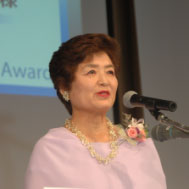Acceptance Speeches
Encouragement Prize :The Japan-Nepal Female Education Association (JNFEA) Chairperson: Yasuko Yamashita

All of us at the NPO Japan-Nepal Female Education Association feel very honored to be presented with this award, the first SAKAI Peace Contribution Award Encouragement Prize. Thank you to all the people of Sakai City, and thank you to the members of the Screening Committee for your kind words.
I am extremely delighted to receive this Peace Contribution Award for Sakai City, birthplace of Yosano Akiko, whom I admire so much. So I would like to begin today with Akiko’s "You Shall Not Be Killed, Brother!":
O my dear brother, I am in tears for you:
you should not be killed.
You were the last-born,
most adored by your parents.
Did your parents teach you to wield the sword to murder other people?
Did your parents raise you
for twenty-four years
to kill and to die?
Since you inherit your parents' name
as proud master of our renowned shop
in Sakaishi,
you should not be killed.
Even if Port Arthur's castle falls,
so what?
You are not aware that killing is not in harmony
with the customs of a merchant family.
You should not be killed.
The Honorable Emperor would not personally
engage in the war.
Since the Emperor's heart is so merciful,
how could he possibly ask
others to shed blood
and die like beasts
and believe that dying is honor?
O my brother,
you should not be killed in battle!
It's said this era is peaceful,
but our mother protects the family
in great sorrow from the death of our father
and now, pained
by her child's conscription,
her hair grows ever whiter.
Have you forgotten your new young wife
lying delicate and beautiful in tears behind her curtain?
Do you still think of her?
Separated after barely ten months wedded,
think of her virginal heart.
Since you are the only you in the world,
whom can she rely on?
You should not be killed, my brother!
(Translated by Sam Hamill and Keiko Matsui Gibson)
It hardly seems possible that this poem was written 104 years ago. The line "Even if Port Arthur's castle falls, so what? You are not aware that killing is not in harmony with the customs of a merchant family." is the very quintessence of the City of Sakai.
For ten years, a civil war against Maoist groups has been ongoing in Nepal, where we carry out our support work. At last it has come to an end. The Japan-Nepal Female Education Association has sent an error message to the Nepalese countryside.
Our project trains female teachers. We once had a first term student, called Lamila Buddha, who came from a region called Bajan, near the western border. At the school entrance ceremony, she gave a wonderful speech and impressed the whole audience, but later, she collapsed twice and fell unconscious. We were all very worried. The cause turned out to be the trauma she had suffered when someone she had respected and relied upon as a brother had been murdered by the Maoists.
This March, I made the difficult journey to her village. The buildings by the airstrip had been reduced to a mountain of rubble, and the suspension bridge for the only road through the village had been blown up by the Maoists and was hanging down pathetically into the valley. My luggage wasn’t carried under that bridge by a cow or horse, but by goats. A convoy of some tens of little goats carried my luggage on their backs. Goats are fine on narrow roads and steep roads, so that’s how luggage is carried in the village.
I went to Lamila’s old elementary school and met the woman who was principal. Apparently, as a child Lamila had had to help at home, and hadn’t been allowed to go school until she was ten. Once she started school she studied very hard, and was able to skip a grade three times while she was still only in elementary school. This June, she went back to Bajan to become a teacher.
As the preamble to the UNESCO Constitution famously puts it, “…since wars begin in the minds of men, it is in the minds of men that the defences of peace must be constructed In Nepal, we train teachers using Oishi Sensei from Sakae Tuboi’s “Twenty-four Eyes as a model. I’m sure many of you must have seen the black and white movie directed by Keisuke Kinoshita and starring Hideko Takamine. I came across a version with English subtitles while in London, and I show it to our students in Nepal every year. There were twenty-four eyes in Oishi Sensei’s class, so that means there were twelve students in all. Five of those were boys.
To proud cheers, these five boys all leave the little village on the headland of Shodoshima to fight in the Pacific War. A soldier’s grave with a wooden marker awaits three of them. One of them, played by Takahiro Tamura, is blinded and returns home in a coma. Our students in Nepal watch this movie over and over again, so the story gets burned into their memories. I really believe they learn to love peace, and all become teachers who will teach their children the spirit of peace.
Nepal still has no system of compulsory education. The new government is apparently extolling the virtues of such a system, as yet but nothing has materialized. Poor villagers who have themselves never been to school, tend to think they don’t need to send their girls to school. One of the United Nations ensures Development Goals that, by 2015, children everywhere, boys and girls alike, will be able to complete a full course of primary schooling How is this gap to be filled?
We are just a tiny, tiny NPO, and there are limits to what we can do. Our thinking is that if in a village school there is a female teacher, perhaps the girls in the village will be able to go school. What we decided to try in Nepal was a system modeled on the government-run teacher training colleges started in Japan in the Meiji Era, where trainees received a stipend during their training before completing a compulsory placement as a teacher in a village elementary school.
The women’s university in Pokhara, a city in the foothills of Annapurna, quickly set up a course for training elementary school teachers. Then we built the Sakura Dormitory. And so began a project whereby young women chosen from villages in the far and central west of the country can study in Pokhara for two years, and then after they graduate go back to teach at an elementary in their own village for at least three years. Retired female teachers also visit Sakura Dormitory from Japan to teach courses.
This June, we were able to send our first ten students back to their villages. Maybe it’s only ten people a year, but in a 10 years that will become a hundred new Oishi Senseis. And thanks to the encouragement and support of the Sakai City, we will work even harder. A group of volunteers from the Takenaka Corporation helped with the design and management of the building project, and it so happens that their representative Mr. Kenzo Akao is a citizen of Sakai City, and he is here today. Also among you today are seventy-four people who are supporting our project as foster parents.
I would like to be able to help turn the goodwill of everyone in Japan towards a contribution to the international community. I would be delighted if, through this award, more people from Sakai City join our association and become foster parents. With this award, which is filled with the dreams of peace of all of the people of the City of Sakai, ever in my heart, I promise you all that the Japan-Nepal Female Education Association will keep moving forward.
Ladies and gentlemen, thank you very much.
